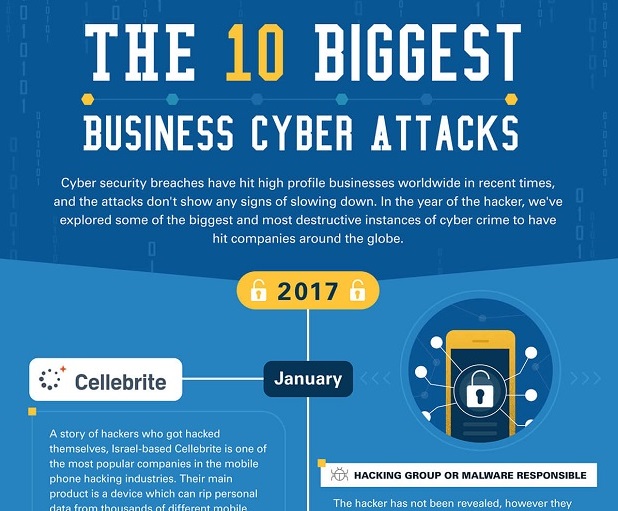2017 has seen some of the most destructive cyber breaches within the business world to date. In light of this, Online Security Experts, vpnMentor have recently conducted research of the 10 biggest business cyber attacks of 2017, highlighting the damage caused, hacking software responsible and how the attacks were resolved.
From the spread ransomware attacks to targeted data breaches, no business is safe from the hands of a hacker. We take a look back at 2017 to uncover some of the biggest and most shocking cyber attacks on some of the world’s largest companies.Some of the biggest hacks this year include:
- The CIA – Despite being dedicated to securing America’s safety from overseas threats, the CIA themselves fell victim to a cyber attack, with many confidential documents being released on WikiLeaks.
- Cellebrite – Cellebrite is a company that produces devices that can pull personal data from mobile phones for military and government use. However, the company fell victim to their own game when their external web server was hacked and 900GB of customer information and technical product data was taken.
- NHS – Though not targeted specifically at the NHS, the WannaCry Ransomware most notably struck the UK health service, preventing workers from accessing their computers and delaying vital medical procedures.
More than any other, 2017 has been the year of the hacker. Cybersecurity breaches have hit high profile businesses worldwide opening the public eye to the risk that cybercrime poses today. Highlighting the prevalence of these attacks, online security experts vpnMentor have created a timeline of 2017’s biggest data hacks on major companies.
The graphic identifies just how widespread a problem this is. The timeline details not only the ten biggest business data hacks that took place this year, but also the hacker or malware responsible and the steps the companies have taken to resolve the problem.
Rage Against the Machine
Covering every industry from UK healthcare through to US national security, the graphic is an inventory of 2017’s most malicious hackers and means of assault, including:
The CIA – Despite being dedicated to securing America’s safety from overseas threats, the CIA themselves fell victim to a cyber attack, with many confidential documents being released on WikiLeaks. They were subsequently criticised for withholding information that could improve the public’s digital security.
Cellebrite – Cellebrite is a company that produces devices that can pull personal data from mobile phones for military and government use. However, the company fell victim to their own game when their external web server was hacked and 900GB of customer information and technical product data was taken.
NHS – Though not targeted specifically at the NHS, the WannaCry Ransomware most notably struck the UK health service, preventing workers from accessing their computers and delaying vital medical procedures. Fortunately, a flaw in its mechanism allowed experts to create a kill switch.
Deloitte – Embarrassingly for the accounting firm who pride themselves on their Cyber Intelligence Centre, Deloitte fell victim to a cyber attack in March. Poor cyber security practices gave way to the breach, as only one password was required to access the administrator account, and subsequently the company’s internal email system.
The City of Dallas – Hackers waited until an emergency test signal was sent out to activate local sirens and recorded the signal. They then played it back at a later date and set off every one of the 156 outdoor emergency sirens in the city for multiple hours.
To uncover the biggest hacks of the year in full, see the full infographic from vpnMentor below:


